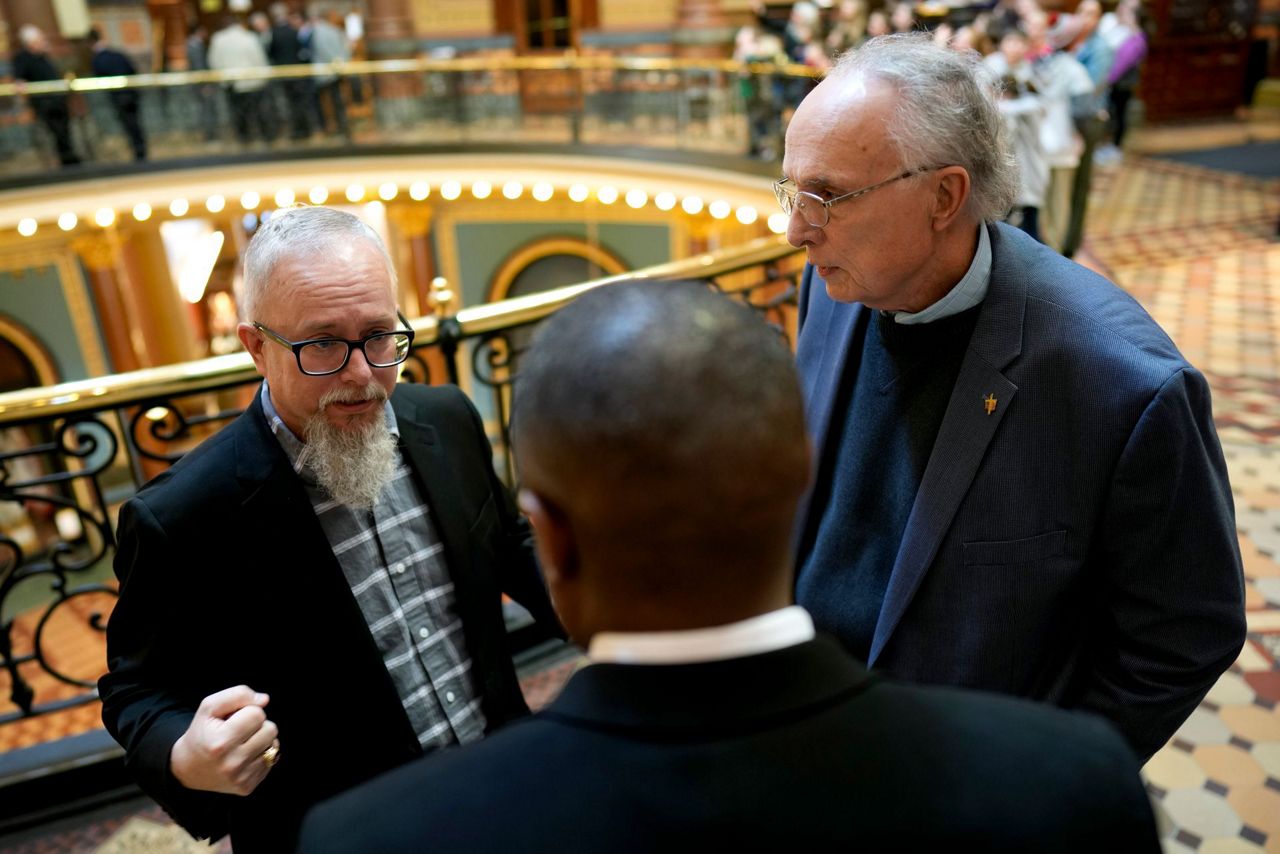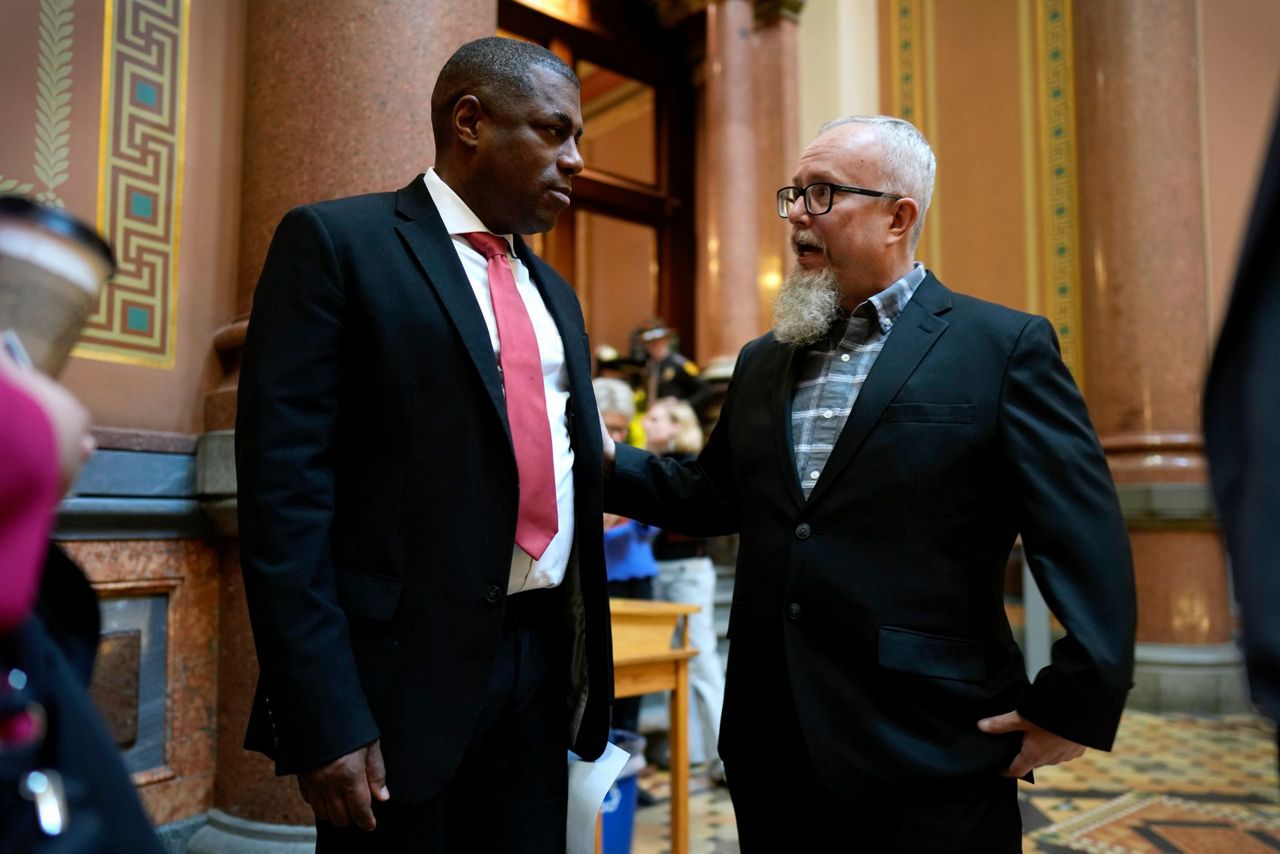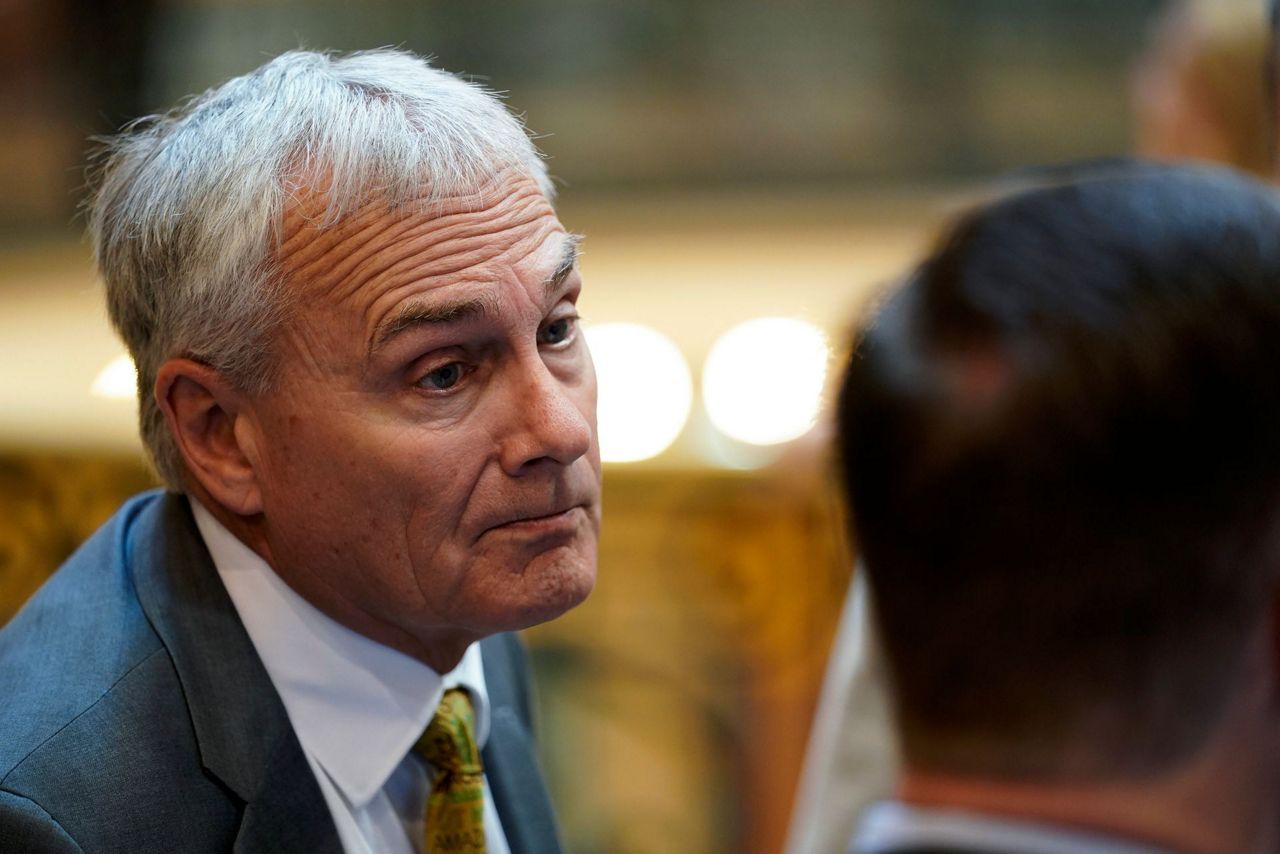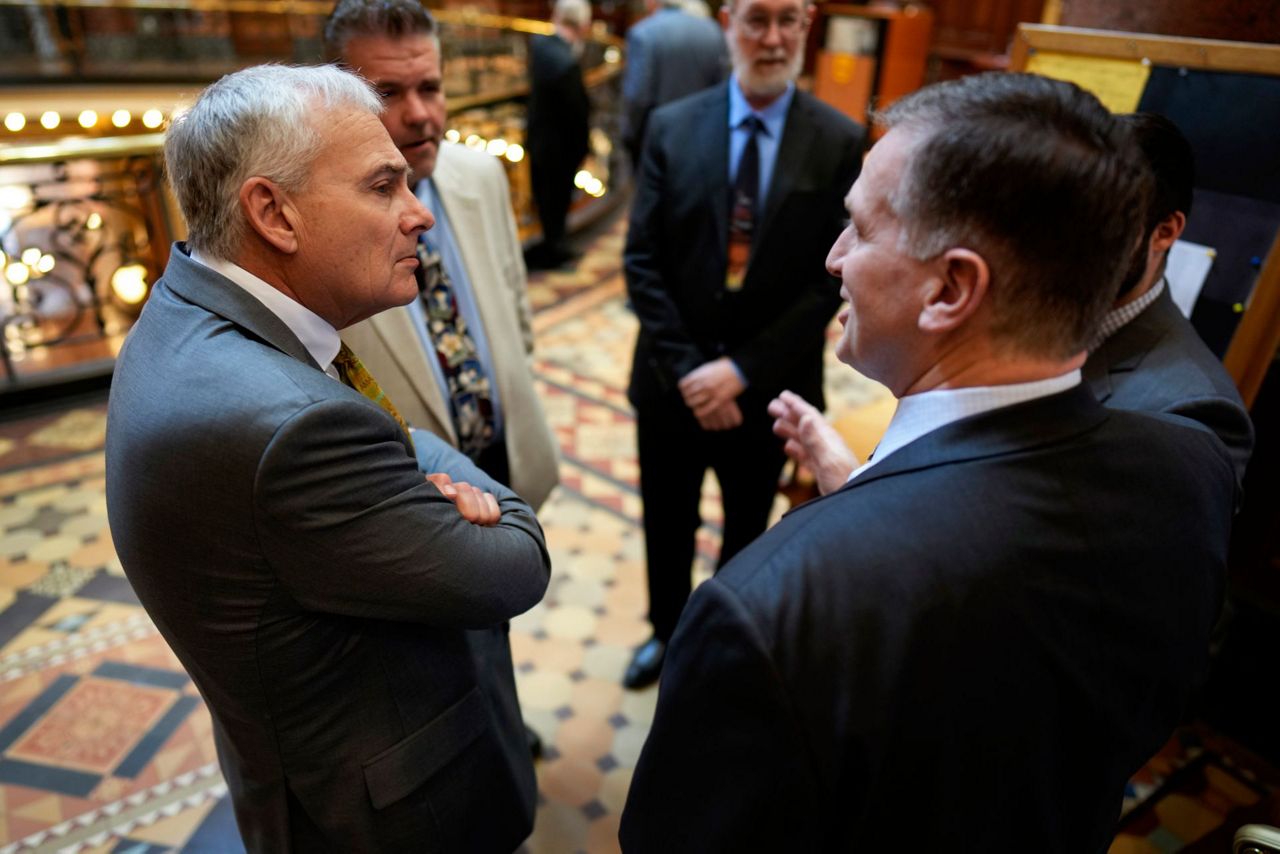MARION, Iowa (AP) — When South Carolina Sen. Tim Scott returns to Iowa on Wednesday, he will meet privately with a group of pastors at a Cedar Rapids church.
For someone considering a Republican presidential campaign, the visit is part of a decades-old courtship ritual in the state that kicks off the nomination process. Born-again Christians are the most influential group in Iowa's GOP caucuses, giving faith leaders particular sway in helping organize voters and shape the results.
But in the early phase of the next presidential campaign, Scott's joyful proclamations of his Christian faith face an unlikely obstacle. Like other Republicans eyeing the White House, he is navigating an evangelical community that is faithful to former President Donald Trump, the thrice-married former reality television star who once supported abortion rights and spent decades boasting of his sexual prowess.
That history repelled many Iowa evangelical leaders during the last competitive Republican caucuses in 2016, when they helped push Texas Sen. Ted Cruz to victory in the opening contest. As the 2024 campaign begins, however, many of those same leaders are open to Trump, grateful for his judicial appointments that resulted in the dismantling of a constitutional right to abortion.
They are unswayed by the controversy swirling around Trump, including the 34-count New York felony indictment handed down against him last week stemming from a hush money payment made to porn actor Stormy Daniels, who alleged having an extramarital affair with him.
“I believe, and I think many evangelical Christians understand, politics at that level is a blood sport. Donald Trump is fighting. That’s why he got things done,” said the Rev. Terry Amann of suburban Des Moines. “So, our role isn’t to judge him.”
Trump has denied having an affair with the actress, Stormy Daniels, and has characterized the charges — along with ongoing investigations related to other matters in Georgia and Washington — as politically motivated. But the evangelical support reflects a broader dynamic taking hold with the GOP base rallying around Trump in the aftermath of his indictment even amid signals that he could be vulnerable with the broader public in a general election.
An ABC News/Ipsos poll released last weekend found 50% of Americans thought Trump should have been charged with a crime and about as many — 48% — said he should suspend his campaign. But just 14% of Republicans said he should be charged.
That GOP loyalty to Trump was evident in interviews with more than a dozen Iowa pastors in the wake of Trump's indictment. Each cited Trump's role in helping overturn Roe vs. Wade as central to the long-term rethinking about him since his first campaign. Several also pointed to Trump's recognizing Jerusalem as Israel's capital and moving the U.S. Embassy from Tel Aviv to the holy city.
“I appreciate the fact that, for what seems like the first time in my lifetime, someone did what they said they were going to do,” said the Rev. Kerry Jech of Marshalltown. “With Donald Trump, what he promised us, he delivered on. That’s one thing I can’t get away from."
In a new display of pragmatism, Jech and others like him who didn't support Trump in 2016 say the former president is no less imperfect a man now, but that his action on policy they hold dear may erase questions about his moral character.
During the 2016 campaign, the Rev. Mike Demastus of Des Moines supported Cruz and called Trump “morally loathsome,” “wicked” and “a reprehensible man." Today, Demastus calls him “the most pro-life president we have ever had,” and would consider supporting him in the caucuses, along with others.
Even Demastus' qualified support still puts Trump in better position now than his first bid.
In a March Des Moines Register Iowa Poll, Trump was viewed favorably by 58% of evangelicals, unfavorably by 39% and 3% were unsure. On the eve of the 2016 caucuses, Iowa evangelicals seemed to have a dimmer view of Trump. The Des Moines Register’s Iowa Poll taken on the eve of the caucuses showed Trump with support from only 19% of evangelicals, with Cruz supported by 33%.
The awkward position is new for Iowa social conservatives, who have for three consecutive Republican presidential campaigns decidedly backed the more vocally evangelical candidate, though none would go on to win the nomination.
Beyond Cruz, former Pennsylvania Sen. Rick Santorum won the 2012 caucuses as a crusading abortion opponent. In 2008, former Arkansas Gov. Mike Huckabee, an ordained Baptist minister, posted a surprise victory by cobbling together a Christian coalition of pastors and religious home-school advocates.
Scott and former Vice President Mike Pence hope to replicate their success in 2024, should they continue taking steps toward running. Scott began his day in Iowa Wednesday meeting with a few dozen Christian home-school parents, a vital subset of Iowa's evangelical bloc.
It's a strategy pioneered by former Christian broadcasting personality Pat Robertson, whose focus on Iowa's network of evangelical Christian churches helped him finish a surprise second place in Iowa's 1988 caucuses, ahead of Vice President George H.W. Bush.
Scott, who is launching an exploratory committee for president, has already met several times with Iowa clergy, as has Pence. Florida Gov. Ron DeSantis, who is expected to run, squeezed in a backstage meeting and prayer with a handful of pastors after a public event in Des Moines last month.
The first multi-candidate gathering of the 2024 Iowa caucus campaign is scheduled for later this month and is expected to feature presidential prospects Pence, Scott, former Arkansas Gov. Asa Hutchinson and others speaking to hundreds of Iowa social conservatives. Trump plans to address the group by video.
The more traditional approach set against Trump's atypical combination of accomplishment and high-drama personal life creates a new dynamic for Iowa social conservatives to weigh.
“President Trump has stood up for the values that we hold dear,” said Brad Sherman, a pastor and Republican state representative from Williamsburg who plans to support Trump in the caucuses. “Then we need to pray for him that his personal life comes in line with that.”
Others say everyone is offered forgiveness.
“He is no perfect person. No one would say that. He is no King David,” said the Rev. Bill Tvedt of Oskaloosa. “But even David was tempted.”
Tvedt also likened Trump to the biblical figure Cyrus, who was not a Christian but is lauded as an Old Testament hero for liberating the Jews from captivity in Egypt. “He is more of a Cyrus, a protector,” Tvedt said.
The Rev. Dave Martin, a Marshalltown pastor, was an outlier in the interviews, suggesting Trump's judicial strategy was aimed at reinforcing support within a group that had doubts in 2016.
“Let's not forget that not that many years ago he was for legal abortion,” said Martin, who says he would likely not support Trump in the caucuses.
Martin also blasted Trump's statement from the 2016 campaign when he rejected the need to repent.
“Why do I have to repent or ask for forgiveness if I am not making mistakes?” Trump asked CNN's Anderson Cooper during a 2015 interview. “I work hard. I’m an honorable person.”
Amann, the suburban Des Moines pastor who rejected judging Trump, said the former president need only worry about evangelical support if his resolve for their priorities weakens.
"If he backs off of pro-life, that would be a bigger issue,” Amann said.
The once anti-Trump DeMastus was quick to remind that Trump blamed devout abortion opponents for Republicans' weaker-than-expected showing in last year's congressional elections. Notably, Trump said candidates who opposed legal abortion in cases of rape or incest or to save the life of the pregnant woman “lost a large numbers of votes."
“That ticked me off so bad,” DeMastus said. “That’s the part of him I'm talking about where he just needs to keep his mouth shut.”
Copyright 2023 The Associated Press. All rights reserved. This material may not be published, broadcast, rewritten or redistributed without permission.






